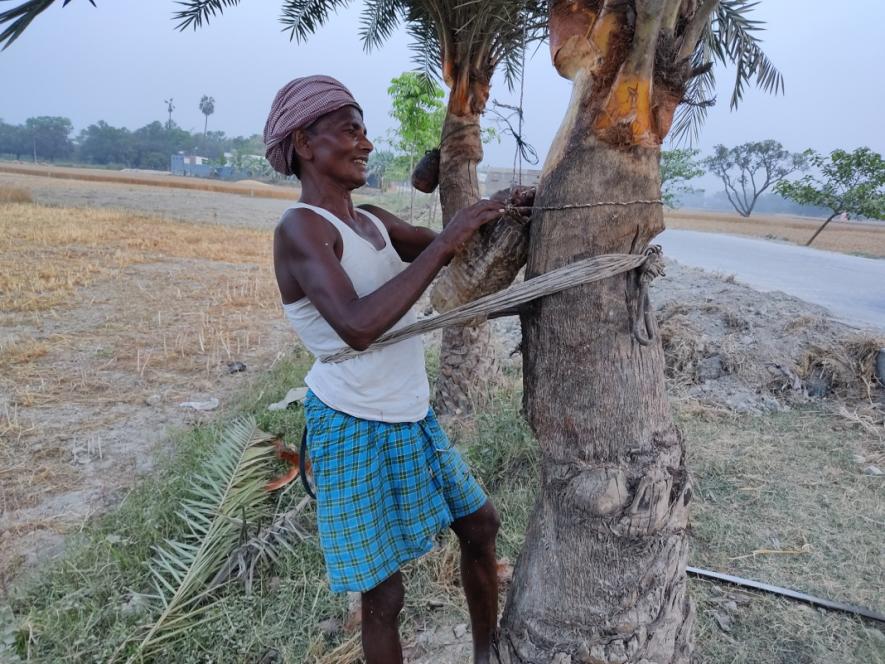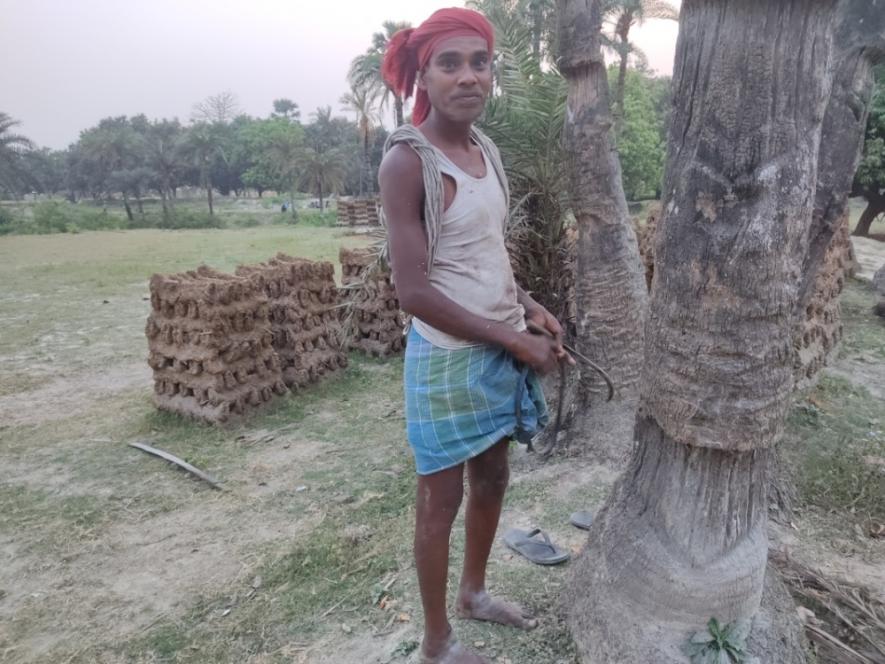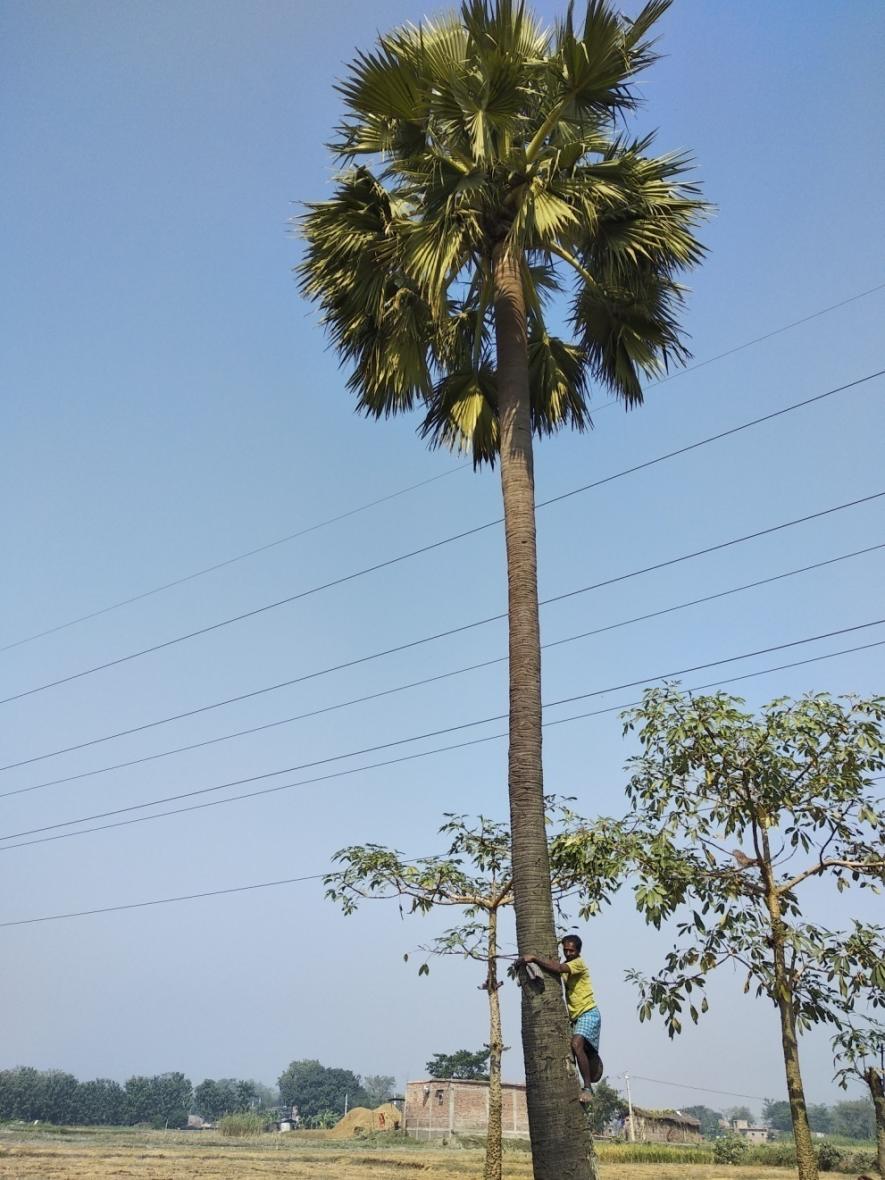Bihar: COVID-19 Pandemic Leaves Toddy Tappers in the Lurch

Krishna Paswan, Vaishali
The COVID-19 pandemic has brought with it further misery for the marginalised Pasi community, with the second wave keeping customers away from toddy shops in Bihar and depriving tappers of palm sap.
When the lockdown was eased, mobility restrictions made the open sale of toddy too tough. Police vans patrolling the villages made toddy sap extraction a colossal task; getting a desired selling price was an even more tedious exercise.
Forty-five-year-old Jagat Paswan was seen climbing a palm tree during the afternoon – the best time for to collect toddy sap – just after the Bihar government decided to ease the COVID-19 lockdown in the state.

Jagat Paswan
A disgruntled Jagat resides in S. Sandha village in Muzaffarpur. He told Newsclick that he had taken on 20 date and palm trees on an annual lease for Rs 8,000, but the lockdown eclipsed all hopes of selling the toddy sap. A subsequent lockdown has pushed him to penury with a per day earning of about Rs 200 gone within days of the lockdown.
Jagat was 16 when he first learned how to crawl up palm trees. Mentored by his father, he went on to become a full-fledged toddy tapper in a couple of years. Hailing from the Pasi community, Jagat and many like him have continued tapping palm wine from trees. However, sustaining a family amid a deep financial crunch has become a difficult task. The community has also not been helped by the government in the form of employment generation, he added.
Tapping toddy is now a two-generation affair in Krishna Paswan's family. “My father did it and was the last to have succeeded him in climbing trees to tap sap from palm trees,” said Krishna Paswan who hails from Bhagwanpur Ratti village in Vaishali district.
Krishna, in his mid-forties, has parked his sickle in a waistband tied to the tree trunk. He said COVID-19 brought in an unexpected financial crunch that disabled smooth run toddy extraction and sale. Locals fond of toddy used to gather under one of the palm trees and purchase the drink.
Peak season sales used to fetch him about Rs 400 a day; it has now been reduced to nothing. The demand for toddy skyrockets only during summer time but the lockdown rendered many of us jobless and ensured we stay at home without work. “How we will take care of our families?” he asked.

Toddy tapper climbing a palm tree
A resident of Jiwdhara in East Champaran, Sanjay Paswan (40) shed light on the Pasi community's plight. He said that despite the lockdown “we ensured toddy extraction thrice a day to maintain the health of the palm trees and prevent them from decay due to overflow of palm sap out of the pots placed near the top of the trees. Whether it could be sold to shops or not, the effort was total waste. We now stare at a bleak future,” he added.
He said that climbing the tree to extract sap was risky too, with many fellow sappers getting hurt after falling from trees.
Tappers need to be over 30 feet from the ground, balancing themselves while using their feet and the waistband around the tree. The toddy tapper attaches a clay pot or plastic bottle to the place he cuts into with his sickle. Both his hands are needed for this operation and this is where he is most vulnerable. The sap will ooze into the pot. For much of the season, it will fill the pot in two to three hours, requiring him to go back up the tree, unhook the filled pot and replace it with an empty one. That could mean one person goes up three times and down thrice on each of 20 to 30 trees in a day.
The majority of the Pasi community disregarded the blanket ban of liquor, which included restrictions on toddy sale, which came as the most severe blow. Since the ban selling toddy has been done in secret, adding to the woes of the marginalised community.
The major failure associated with the liquor ban was the inability of the government to provide alternate livelihoods to communities traditionally engaged in making and selling toddy like the Pasis, and the arrests of large numbers of persons from marginalised communities.
To quell mass discontent, Bihar CM Nitish Kumar came up with the ‘Neera Project’ as an alternative employment for the tapping community,
Subsequently, Bihar State Milk Co-Operative Federation Ltd (COMFED) decided to set up a Neera (Non-fermented palm drink) processing plant in four districts in the state – Hajipur, Nalanda, Gaya and Bhagalpur – as they have a high density of palm and date trees. The plan was the commercial production of allied products such as jaggery, laddu, peda, ice cream, cake and jam.
According to a survey conducted by the agriculture department, there are around 1.3 crore palm trees, including date and coconut trees in the state and each tree can produce up to 10 litres of Neera daily.
It was mandated that toddy tappers who choose to tap Neera will have to get a licence for free from the excise department. After getting the licence, they can also sell Neera, which is rich in vitamins and minerals, in the open market, or make jaggery and sugar from it. While the licensing began in 2017, rescuing the Pasi community seems to be a distant dream.
The author is a Bihar-based independent journalist.
Get the latest reports & analysis with people's perspective on Protests, movements & deep analytical videos, discussions of the current affairs in your Telegram app. Subscribe to NewsClick's Telegram channel & get Real-Time updates on stories, as they get published on our website.
























